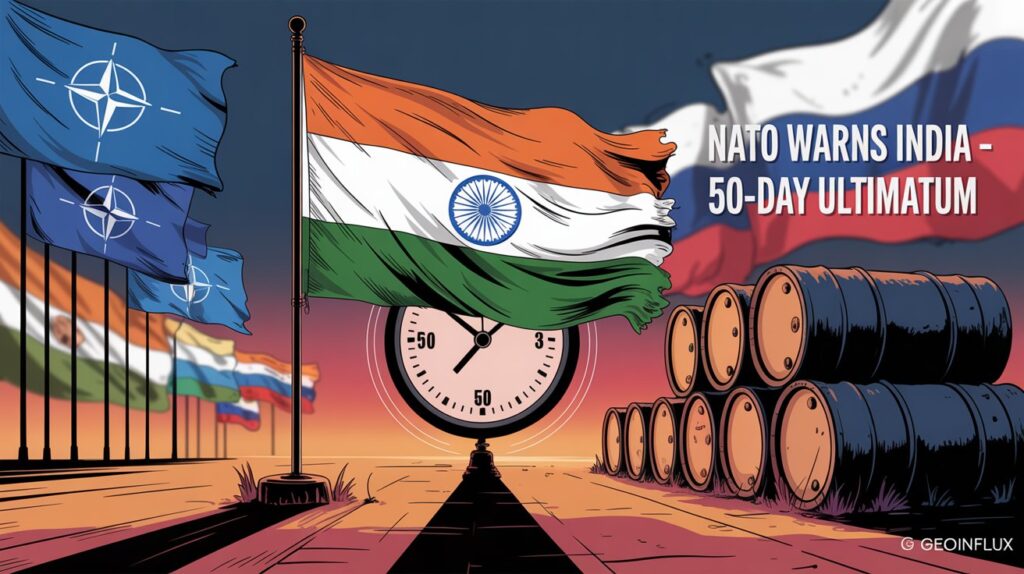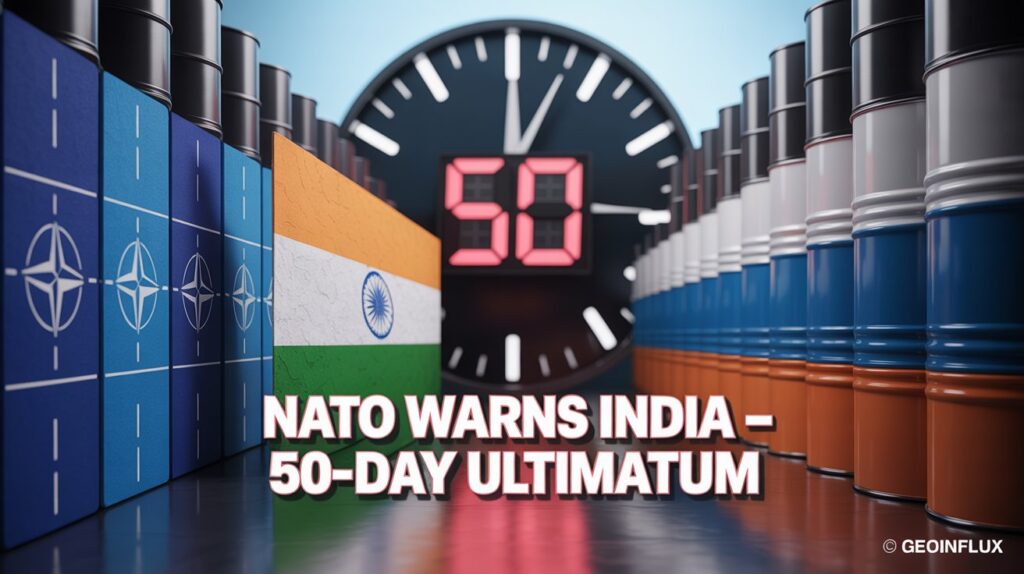NATO warns India with a bold 50-day ultimatum. Will Delhi face 500% tariffs or defend its Russia ties and strategic autonomy amid rising global tensions?
NATO Warns India: 50-Day Ultimatum Sparks Global Crisis Over Russia
New Delhi, July 2025 – In a bold escalation of diplomatic pressure, the North Atlantic Treaty Organisation (NATO) has issued a 50-day ultimatum to Russia, demanding a full ceasefire in the ongoing Ukraine conflict.
But the shockwave from this directive is not limited to Moscow. As NATO warns India, China, and Brazil, the message is clear: maintain trade ties with Russia at your peril.
The unprecedented step could drastically reshape India–Russia trade relations, test India’s strategic autonomy, and challenge its non-aligned stance on global conflicts.
🔸 Why Did NATO Warns India in 2025?
The Russia–Ukraine war, now dragging into its third year, has led to a humanitarian disaster and geopolitical fatigue. Western sanctions have failed to stop Russia’s advance.
In response, NATO, reportedly influenced by Donald Trump’s Russia policy, has adopted a strategy to pressure Russia indirectly by targeting its trade partners.
NATO Secretary-General Mark Rutte delivered the warning, allegedly stating, “If you live in Delhi, you will be hit hard,” indicating that NATO sanctions on India may soon follow if trade with Moscow continues.
✅ What is the 50-day ultimatum from NATO?
A deadline given to Russia to cease military operations. If unmet, it could lead to sanctions not only on Russia but also on its trade allies, including India.
Also Read
- India-EU Free Trade Agreement 2026 Explained: Why the “Mother of All Deals” Is Reshaping Global Trade and Power
- AI Latest News 2026: January AI News in India and Global AI Trends Explained
- Why Digital Sovereignty Is Now a National Security Issue in 2026?
- Did the US Raid in Caracas Reveal the Real Limits of Chinese JY-27 Radar and Russian S-300 Air Defense?
- How Tech Geopolitics Dramatically Redefined Digital Sovereignty and National Power in 2025?
📌 India’s Strategic Dilemma: Trade or Autonomy?
India has continued strong economic ties with Russia throughout the war. With India’s oil imports from Russia at record highs and defence contracts ongoing, the ultimatum puts New Delhi in a tough spot.
✅ Why did NATO warns India in 2025?
Due to India’s growing trade with Russia, especially in oil and arms — seen as indirect support for Moscow’s war.✅ What is India’s stance on NATO’s ultimatum?
India supports peace but emphasizes strategic autonomy in its foreign policy, resisting forced alignment.
Strategic autonomy remains the cornerstone of India’s foreign policy. Officials have reiterated that New Delhi won’t accept externally imposed deadlines that affect its sovereign decisions.
✳️ Donald Trump’s Influence and Flip-Flop Diplomacy
Former U.S. President Donald Trump, known for erratic foreign policy shifts, reportedly influenced NATO’s aggressive posture. Sources say “Trump initially urged Ukraine to bomb Moscow, then reversed himself, advising patience for the 50-day deadline.”
✅ Is Donald Trump behind NATO’s ultimatum?
Yes, Trump’s flip-flop diplomacy appears to be shaping NATO’s moves. His unpredictable behavior makes enforcement uncertain.
The close alignment of Mark Rutte and Trump has sparked criticism, with observers warning that NATO’s credibility may be undermined by personal political agendas.

📍 Russia’s Rejection: No to Foreign Pressure
In response, Russia immediately rejected the ultimatum as “unacceptable”, stating that no foreign power has the right to dictate peace terms.
✅ What was Russia’s response to NATO’s ultimatum?
A firm refusal, citing sovereignty and internal decision-making.
This puts India in a bind: maintain ties with a defiant Moscow or risk falling under NATO’s economic threats, potentially facing 500% tariffs on trade.
🔺 Trade Weaponisation: India Faces Sanctions Risk
A proposed Russia sanctions bill being discussed in NATO member states could impose devastating tariffs ranging from 100% to 500% on countries like India that continue importing from Russia.
✅ Will India face NATO sanctions over Russia trade?
If NATO’s threats materialize, India could face heavy tariffs and global diplomatic isolation.✅ Could India stop trading with Russia?
Experts believe India may look to diversify, but cutting Russian ties abruptly would severely impact energy security and defense readiness.
Such measures could cripple the Indian economy, which is why policymakers are exploring diplomatic channels to de-escalate the pressure while protecting India–Russia trade relations.
🌐 Europe’s Growing Dissent: Is NATO United?
Despite NATO’s official position, countries like Slovenia and Germany have begun questioning the long-term impact of sanctions.
✅ Is Europe united on NATO’s stance?
No, divisions are growing. Some EU nations fear that sanctions are backfiring economically without achieving peace.
This global reaction to NATO’s ultimatum is far from unanimous. Many worry the alliance’s cohesion may weaken as economic pain spreads.
📣 The Path to Peace: Time for Dialogue, Not Deadlines
Global analysts argue that threats and deadlines won’t bring peace — only direct negotiations between Russia and Ukraine will.
✅ What is the solution to the war according to experts?
Experts call for an inclusive summit where Russia and Ukraine can negotiate without preconditions.✅ How should India respond to NATO’s pressure?
By maintaining strategic autonomy, upholding sovereignty, and pushing for multilateral dialogue instead of unilateral demands.
Even China has condemned what it calls “illicit unilateral sanctions”, criticising the weaponisation of trade and warning against coercive diplomacy.
📉 Markets React: Sanctions Shockwaves or Political Theatre?
The markets have responded with volatility. Oil prices jumped, the Indian rupee weakened slightly, and defence stocks surged in anticipation of supply shifts.
✅ How have global markets reacted?
Instability and investor anxiety dominate, though many believe the 50-day deadline may be extended or softened due to NATO’s internal divisions.
Still, the credibility of NATO’s warning to India depends heavily on follow-through, and with Trump’s track record of policy reversals, confidence remains shaky.
🧭 Conclusion: NATO’s Bold Move, India’s Tough Choice
As NATO warns India and other major non-Western economies, the world is entering uncharted diplomatic territory. The line between economic policy and political coercion is becoming dangerously thin.
India now faces one of its toughest foreign policy tests: Can it balance its strategic autonomy, economic stability, and long-standing ties with Russia, while avoiding a direct showdown with NATO?
In this high-stakes game of power politics, the next 50 days may redefine India–NATO relations for years to come.
🧾 Key Highlights: NATO’s Warning to India
| Element | Details |
|---|---|
| Main Focus | 50 days for Russia to implement the ceasefire or face escalation |
| Ultimatum Issued | Balance strategic autonomy vs the risk of NATO sanctions and trade disruption |
| India’s Dilemma | 50 days for Russia to implement the ceasefire or face escalation |
| Economic Threat | 100%–500% tariffs proposed on countries importing Russian oil/goods |
| Donald Trump’s Role | Influenced NATO’s aggressive stance; history of flip-flop diplomacy |
| Russia’s Response | Rejected NATO demands as foreign interference |
| European Division | Countries like Slovenia oppose further sanctions; cracks within NATO |
| India’s Position | Stresses sovereignty, peace via diplomacy, not coercion |
| China & Global South View | Condemn unilateral sanctions; defend trade independence |
| Outcome Uncertain | NATO warns India over continued trade with Russia amid the Ukraine war |
🔗 Related Articles on GeoInflux.com
- Explosive India-China Border Tensions: Arunachal CM’s Bold Tibet Claim Ignites Diplomatic Firestorm
- India’s Stunning BRICS Summit 2025 Victory: 5 Key Takeaways That Redefined Global Power
- China’s laser attack on German jet, 5 shocking revelations that highlight rising geopolitical tensions
📚 References
- NATO Official Statements – Official updates and press releases from the North Atlantic Treaty Organisation.
- India’s Russia Oil Imports Surge Despite Western Pressure – The Hindu – Analysis of India’s continued energy trade with Moscow.
- NATO Issues 50-Day Ultimatum to Russia – Reuters – Details on NATO’s warning and conditions for ceasefire.
- India Stresses Strategic Autonomy as NATO Warns Over Russia Ties – Economic Times – India’s diplomatic position and trade defence.
- China Opposes Illicit Unilateral Sanctions – Global Times – China’s reaction to NATO’s proposed 500% tariff threats.
- Slovenia Blocks New EU Sanctions Against Russia – Politico EU – Example of growing dissent within Europe.
- Trump’s Russia Policy: Pressure, Unpredictability, and Retreat – Foreign Policy – How Donald Trump’s influence is shaping NATO’s ultimatum.
- Russia Rejects Ceasefire Deadlines as War Nears 3rd Year – BBC News – Moscow’s strong rejection of NATO deadlines.
- India’s Strategic Autonomy in a Polarised World – Brookings – A policy think tank’s view on India’s neutral stance and long-term strategy.
🙏 Thanks for Reading
Thank you for reading this in-depth analysis on NATO’s warning to India and its far-reaching global implications. At GeoInflux, we’re committed to decoding global dynamics with clarity and integrity. If you found this article insightful, please share it with your network and subscribe for more real-time geopolitical updates.
➡️ Stay informed. Stay empowered.
📬 Have feedback or a perspective to share? Drop a comment or connect with us on Telegram, Twitter, or Facebook.





Pingback: EU India Sanctions Showdown: Nayara Refinery Hit in Power Move Over Russian Oil Ties
Definitely consider that which you said. Your favourite reason seemed to be on the web the easiest thing to take note of. I say to you, I certainly get annoyed at the same time as folks think about issues that they plainly don’t recognise about. You managed to hit the nail upon the highest as well as outlined out the whole thing with no need side-effects , other people can take a signal. Will probably be back to get more. Thanks
Just wanna remark on few general things, The website design and style is perfect, the written content is very good. “We can only learn to love by loving.” by Iris Murdoch.
Lovely website! I am loving it!! Will come back again. I am taking your feeds also.